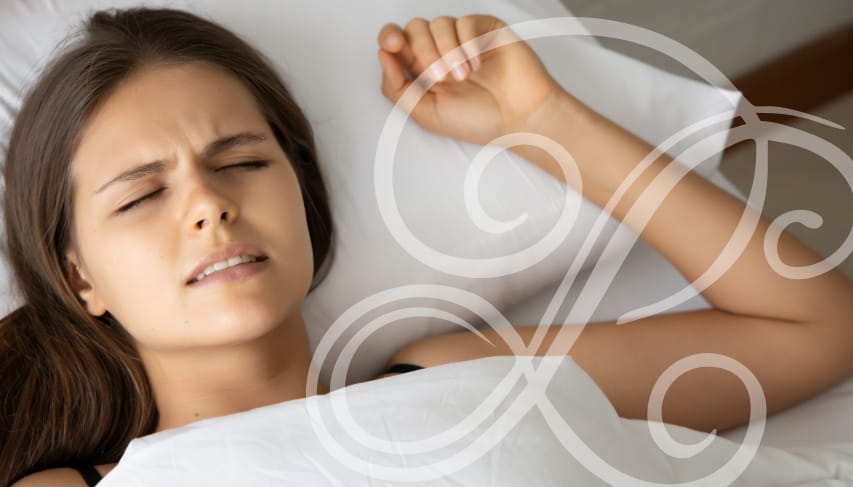Learn the Facts: Protect Your Teeth From Bruxism

Bruxism: How to protect your teeth from grinding and clenching.
Do you sometimes unconsciously clench or grind your teeth? If so, you suffer from bruxism. Bruxism is a condition that causes tooth clenching and grinding, and approximately 30% of the population suffers from it in some way. It’s hard to pinpoint an exact number because most people do it in their sleep.
Even if it’s not apparent to you, your dentist may see the signs of tooth grinding during your routine dental evaluation. Once it is pointed out, addressing the problem is important for protecting your oral health. Many risks are associated with this condition, including tooth loss.
Although you can’t always stop yourself from grinding your teeth, you can prevent the potential damage it causes. Learning to protect your teeth will keep them from wearing away and requiring expensive dental treatment.
Understanding Bruxism
Bruxism can occur during the day or at night when you sleep. They are considered to be two separate conditions, categorized as awake bruxism and sleep bruxism. When you’re awake, teeth grinding is usually connected to emotional issues. Feelings of anger or stress can cause clenching, but so can intense concentration on something.
Sleep bruxism happens when you grind your teeth at night, which may be more harmful than doing so during the day. You may not realize how much pressure you put on your teeth, leading to tooth problems or jaw pain.
There is more than one cause of teeth clenching and grinding, but some factors include:
- Stress
- Bite problems
- TMJ problems
- Airway constriction
- Unhealthy lifestyle habits
- Sleep disorders
- Personality type
- Medication, drug, and substance abuse
- Mental health conditions
- Family history
The specific cause of your condition can be challenging to determine, which makes it difficult to treat.
Signs and Symptoms
Some people know they clench or grind their teeth because they do it during the day. However, because so many people have sleep bruxism, it’s not until they begin noticing other symptoms that they become aware of a problem. Symptoms of bruxism include:
- Tooth wear
- Generalized cold sensitivity in all the teeth
- Jaw pain
- Headaches, primarily upon waking up
- Earaches or ringing in the ears
- Face, neck, and shoulder pain
- Worn-down or broken teeth
- Disrupted sleep
It’s important to recognize these symptoms and seek treatment to prevent them from worsening or causing permanent damage. A dentist can diagnose this condition based on your symptoms and a physical evaluation of your oral cavity.
Strategies to prevent and manage bruxism.
It’s impossible to stop yourself from clenching and grinding while you sleep. Because of this, the best way to mitigate damage is by using prevention and management strategies, which you can discuss with a dental professional.
One strategy is to manage stress and find relief. Stress is a leading trigger for tooth grinding, so finding a way to relieve stress can minimize the frequency and severity of your condition. Relaxation techniques like meditation and yoga may be helpful.
Sometimes, lifestyle changes are necessary to reduce grinding and clenching. Foods that contain caffeine, alcohol, and sugar can trigger your bruxism. Avoiding these items can protect your teeth and keep your condition from worsening.
Another way to protect your teeth from bruxism is to wear a nightguard. These dental appliances place a barrier between your teeth. Your dentist can create a custom nightguard to alleviate pressure on the temporomandibular joint. Wearing it every night will reduce headaches, joint pain, and wear on your teeth.
Seeking Professional Help
If you notice any symptoms related to bruxism, consult your dentist for a diagnosis and personalized treatment plan. They’ll complete a comprehensive evaluation to determine the extent of your condition and make recommendations based on your individual needs.
For some patients, wearing a nightguard resolves the problem. More challenging cases may require psychological counselling or medication. Muscle relaxants and antianxiety drugs are often prescribed for short-term control. Physical therapy, including mouth stretching exercises and massages, can also help.
Some dentists may recommend Botox for patients with a severe case of bruxism. These injections provide temporary relaxation for your jaw muscles, helping to reduce pain. It requires repeat treatments to maintain results, typically at three- or four-month intervals.
The future for patients with bruxism.
Every patient is different. But the outlook is typically good when action is taken to address bruxism. Sometimes, the condition will resolve itself after you manage your stress levels. If it doesn’t, protecting your teeth with a nightguard is the best decision you can make. Otherwise, you may be in for a lifetime of discomfort and costly dental treatments.
Parmer Lane Family Dentistry in Austin, TX
Do your mornings start with pain radiating down your face? You may be one of the many suffering from bruxism. Whether you’d best benefit from temporary treatment to get you through a stressful situation or a long-term solution to manage your condition, you need an expert in dental in Austin, Texas. Parmer Lane Family Dentistry has the skills and knowledge to help you manage your condition. Contact us today to schedule a consultation.